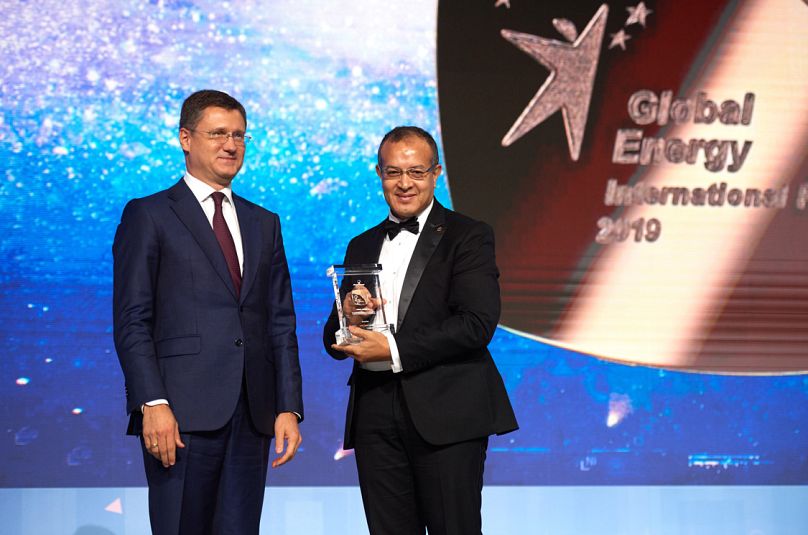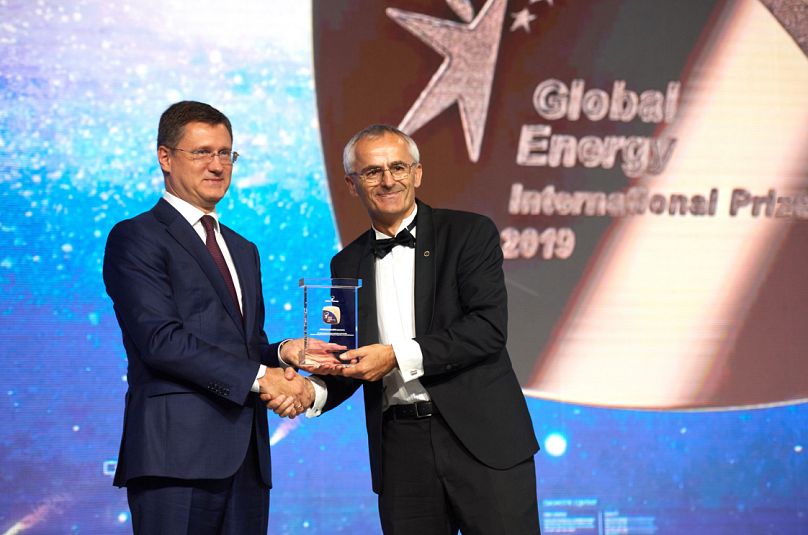Many of the greatest challenges facing the world today revolve around sustainable energy: how to create it, how to store it, and how to use it most efficiently.
With rising temperatures around the globe and a steady increase in the occurrence of extreme weather events, nothing short of worldwide collaboration is likely to create solutions that will prevent the depletion of the world’s natural resources.
The Global Energy Prize, which this year took place on 3 October in Moscow, was conceived with this aim in mind.
Rewarding excellence
Internationally recognized as one of the highest academic awards in the world, the Prize seeks to reward scientists, engineers and inventors for outstanding achievements in the field of energy production and conservation, from discoveries and research to engineering projects that improve the efficiency of energy use.
Since 2003, it has recognised 39 scientists from 13 nations. Starting from 2019 it will award experts from one of three distinct areas: traditional energy (which includes electric and nuclear power, as well as extraction and transportation of fuel); non-traditional energy (such as renewable energy sources, bioenergy and hydrogen energy); and new ways of energy application (rewarding breakthroughs in materials, efficiency, power storage and energy transportation).
And the winners are…
At the awards ceremony in Moscow, Russian Minister of Energy Alexander Novak awarded commemorative medals to two scientists: Dr Khalil Amine, for his “outstanding contribution to the development of efficient electrical energy storage technology”; and Professor Frede Blaabjerg for “outstanding technical contributions to the design of power management systems enabling the integration of renewable power”. They will also share the monetary reward - 39 million roubles (€547,000)
Reimagining the potential of battery storage
Dr Amine, a US citizen born in Morocco, is recognized throughout the world for his pioneering work with low-cost battery systems, which has contributed to the efficiency of electric vehicles, the so-called ‘smart grids’ and domestic electric appliances.
He has designed anodes, cathodes, electrolytes and technology used by many multinational corporations – among them General Motors, Samsung, BASF and LG Chemical – and is the most cited scientist in the world on the topic of accumulator batteries.
Perhaps his greatest achievement to date is the NMC (nickel-manganese-cobalt) cathode, which is used in lithium-ion batteries, and offers longer life, as well as being less prone to explosions at high voltages than previous types. It is used by companies such as BMW, Ford and Toyota in the batteries of electric cars across the globe.
Dr Amine’s more recent innovations include solutions for storing wind and solar energy in smart grids, along with technologies that power consumer electronics and medical equipment, and a new ‘superoxide’ closed-system battery. This has the potential to store up to five times more energy than standard lithium-ion batteries, and it is hoped that over time this will contribute to the growing popularity of electric vehicles.
Harnessing the wind
The Times Higher Education magazine once described Professor Frede Blaabjerg as the most quoted and successful researcher in the world in the field of engineering. Professor Blaabjerg, from Denmark, specialises in power electronics and their applications, including their use in wind turbines, photovoltaic systems and adjustable speed drives.
He has been named among the World’s Most Influential Scientific Minds by Thomson Reuters, and been involved in over 50 research projects for major manufacturing corporations. The results of these have been used by leading companies such as Fuji, Mitsubishi and KK-Electronics.
Professor Blaabjerg’s work in the 1990s on energy conversion from wind turbines is thought to have saved tens of millions of dollars annually, and more recent innovations have helped to stabilise the energy output of such turbines in the power grid.
At a domestic level, his inventions are widely used for heating, ventilation and air-conditioning systems, making them more energy-efficient, and saving households millions of dollars a year.
Joining a prestigious hall of fame
Previous recipients of the award have come from 13 different countries – Australia, Austria, Canada, Denmark, France, Iceland, Japan, Russia, Sweden, Switzerland, Ukraine, the UK and the USA – and include the finest minds from many different areas within the energy sector.
Among those whose legacy continues to benefit the world today are Akira Yoshino, without whom we would not have the lithium-ion batteries that power our portable devices. Shuji Nakamura and Nick Holonyak gave us the LEDs used in so many fields today, from domestic and industrial lighting to car manufacturing.
Thanks to Rodney John Allam, we have power plants processing hydrocarbon fuel with zero carbon dioxide emissions, while Arthur Rosenfeld broke new ground in the creation of smart, energy-efficient buildings.
These make up just a handful of those luminaries recognised by the Global Energy Prize, and will no doubt be joined over time by many more game-changing pioneers and exceptional scientific minds.
Powering the future
The purpose of the award is twofold, however, and aims not only to recognise excellence, but to mobilise international cooperation in the fight against climate change. The demand for sustainable, reliable and affordable energy is universal and was the primary motivation of the Global Energy Association when they created the Prize.
The urgent need to transform our global systems in order to provide clean energy solutions for present and future generations requires worldwide collaboration and political will, as well as the investment and support that scientists such as Khalil Amine and Frede Blaabjerg need if they are to continue their essential research.
Awards such as the Global Energy Prize raise awareness among nations and promote the possibility of private investment and the partnerships between organizations that will be key to tackling the challenges of the future.



